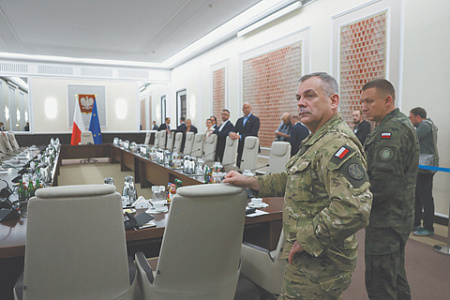
Tensions between Russia and the NATO alliance have escalated sharply after Russian-made drones entered Polish airspace, prompting Warsaw to invoke emergency consultations under the North Atlantic Treaty. NATO fighter jets were scrambled to intercept the drones, successfully downing several in a significant incident that threatens to broaden the conflict surrounding Ukraine.
On the night of September 9, approximately two dozen unmanned aerial vehicles crossed into Poland from its eastern border, allegedly originating from Belarus. In a swift military response, Dutch F-35 fighter jets operating under NATO command engaged and shot down a number of the drones. While there were no reported casualties, minor property damage occurred. Polish officials immediately attributed the drones to Russia, escalating the diplomatic fallout.
Moscow acknowledged conducting extensive drone strikes against military-industrial targets in western Ukraine during the same period but firmly denied any intention to strike Polish territory. The Russian Ministry of Defence expressed its readiness to hold consultations with its Polish counterparts to clarify the incident. Concurrently, Belarus’s Chief of General Staff, Pavel Muraveyko, claimed the drones had deviated from their flight path due to electronic warfare and that Minsk had alerted both Poland and Lithuania about the stray objects.
For Warsaw, the incursion is being treated as a deliberate provocation rather than an accident. Polish Prime Minister Donald Tusk highlighted the gravity of the situation, stating, “This is the first time that drones violating Polish airspace have flown directly from Belarus, not from Ukraine.” In a formal diplomatic move, Poland invoked Article 4 of the NATO treaty, which allows a member to call for consultations when it feels its security or territorial integrity is under threat. The Russian ambassadors in both Poland and Lithuania were summoned to their respective foreign ministries.
The North Atlantic Council convened to discuss Poland’s request, with allies expressing full solidarity. NATO Secretary General Mark Rutte condemned what he termed Russia’s “reckless behavior” and confirmed a full investigation is underway. Significantly, there has been no mention of invoking Article 5, the alliance’s collective defense clause. Analysts note that even a theoretical invocation of Article 5 does not trigger an automatic military response, but rather allows each member state to take such individual or joint action “as it deems necessary.”
The incident has elicited diverse international reactions. In the United States, former President Donald Trump commented on social media, asking, “what is this story with Russian drones violating the airspace” of a NATO country. Meanwhile, Hungarian Prime Minister Viktor Orbán, while calling the border violation “unacceptable,” framed it as further proof of the need for his peace-seeking policy. This stance, however, is contrasted by Hungary’s recent request for a €16.2 billion EU loan for military rearmament, underscoring the growing sense of insecurity along NATO’s eastern flank.
